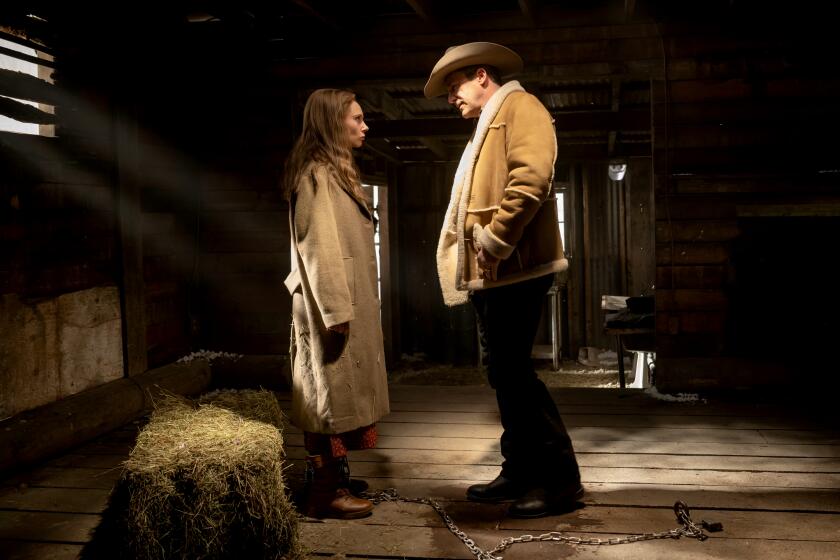On Location: Porn production plummets in Los Angeles

As Hollywood battles to keep movie and TV shows from leaving the state, another local industry — adult entertainment — is fleeing Los Angeles.
At least that’s the picture that emerges from the latest data on location filming in the region.
The number of permits issued for X-rated productions plummeted about 90% to just 40 permits last year compared with 2012, according to data from FilmL.A. Inc., the nonprofit group that handles film permits for the city and county. Only 20 permits have been issued so far this year.
The decline follows the passage in late 2012 of a county law mandating condom use by performers.
“We’ve seen a dramatic drop in permits,” said Paul Audley, president of FilmL.A. “It is a cause for concern that people who are manning the cameras, lights and other things on those sets are not working anymore.... It’s not helpful to have another segment of the industry leave the region.”
The decline in permitted shoots for adult entertainment comes at a time when L.A.’s workforce has been hammered by one of the state’s highest unemployment rates. The entertainment industry has also been hurt by the flight of mainstream movies and TV shows to other cities and states offering tax breaks and rebates.
Although critics say it’s unclear how many companies may be filming illegally without permits, porn producers say they’re taking their business to other counties in Southern California, as well as Nevada, Florida and Eastern Europe, where they say they face fewer regulations. The industry also has been forced to downsize amid declining DVD sales and free porn on the Internet.
“We’re not shooting in L.A. anymore,” said Steven Hirsch, founder and co-chairman of Vivid Entertainment. “We’d like to stay here. This is our home, where we’ve produced for the last 30 years. But if we’re forced to move, we will.”
The situation is the same at Penthouse Entertainment in Chatsworth. The company, which has 10 television channels and produces up to 80 movies a year, has stopped all local film shoots.
“This month we’re shooting 10 movies in Brazil,” said Kelly Holland, managing director for Penthouse Entertainment. “Last month, we shot five movies in Europe. It’s just too complex to shoot here.”
The decline in adult entertainment has been widely felt in the San Fernando Valley, where much of the multibillion-dollar industry is concentrated.
Although porn production accounts for less than 5% of all film permits, the industry has traditionally been an important contributor to the local economy. A decade ago, local economists estimated that the porn industry in the San Fernando Valley generated 10,000 to 20,000 jobs annually and had $4 billion in annual sales.
As many as 5,000 adult films were shot in Los Angeles in warehouses and private homes in 2011, according to industry estimates.
“Losing an industry like that is going to have hugely negative consequences,” said Stuart Waldman, president of the Valley Industry and Commerce Assn.
“We’re not just talking about actors or the filmmakers, but everyone from the grips and caterers to assistants,” Waldman added. “These are people who live in the San Fernando Valley, buy homes, cars, send their kids to school and go to the dry cleaners. If they move, all the money goes with them.”
Whereas conventional film and TV producers blame tax credits for driving production outside California, porn industry producers cite fallout from Measure B, the ordinance passed by L.A. County voters.
The law was advocated by AIDS activists, who argued that it would protect performers from disease outbreaks.
But the measure has been assailed in the porn industry, which has argued that mandatory actor testing for HIV was already effective, and that the law’s real intent was to drive them out of business.
Industry advocates also have argued there is little market demand for condom porn and that many performers object to wearing condoms.
Vivid Entertainment and others sued the county last year to prevent implementation of the condom requirement.
A U.S. district judge found that the condom mandate did not violate the 1st Amendment right to free speech, but imposed restrictions on how the rule can be enforced. A federal appeals court is expect to rule on the lawsuit later this year.
Michael Weinstein, president of the AIDS Healthcare Foundation, which backed Measure B, disputes the notion that the porn industry is leaving L.A.
“There is no question people are filming without permits,” Weinstein said. “We’re not against porn. We’re not trying to drive them out of business. We want to protect the performer and we want them to be a safe industry like any other industry.”
Causing further alarm in the industry is a bill that would mandate condom use statewide and require mandatory testing of adult film actors. The bill, AB 1576, was approved by the California Assembly in May and could be voted on by the state Senate this month.
Members of a coalition of industry groups, who testified against the bill at a Senate hearing Monday, said the measure was crafted without their input. They contend that a statewide condom mandate would give them less reason to remain in California.
“They are working so hard to keep mainstream production in California while driving another type of legal production outside the state,” said Diane Duke, chief executive of the Free Speech Coalition, a trade group for the adult entertainment industry.
Assemblyman Isadore Hall III (D-Compton), who sponsored the bill, has argued that the law is necessary to protect performers from sexually transmitted diseases.
“It’s not that the industry is being targeted,” he said. “The industry is being asked to protect their employees and provide them workplace protection.”
Hall notes that several porn studios with long-standing condom requirements have been successful. Like Weinstein, he also disputes the claim that porn filming is in decline.
“That is absolutely not true,” he said.
More to Read
From the Oscars to the Emmys.
Get the Envelope newsletter for exclusive awards season coverage, behind-the-scenes stories from the Envelope podcast and columnist Glenn Whipp’s must-read analysis.
You may occasionally receive promotional content from the Los Angeles Times.







